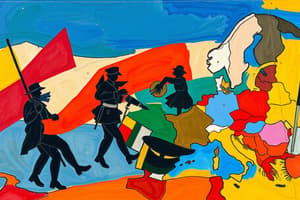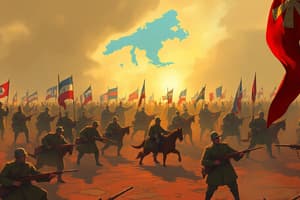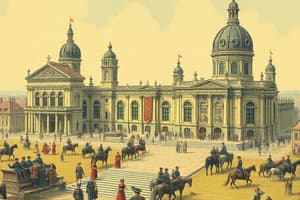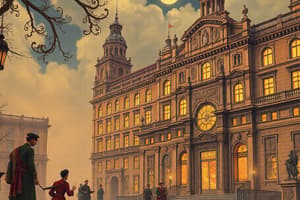Podcast
Questions and Answers
Quale di queste affermazioni descrive meglio il ruolo dei sottomarini e degli U-boot durante la guerra?
Quale di queste affermazioni descrive meglio il ruolo dei sottomarini e degli U-boot durante la guerra?
- Interferirono con il commercio e le rotte di trasporto. (correct)
- Scomparvero dall'uso militare a causa della loro inefficacia.
- Aiutarono a mantenere le rotte commerciali sicure.
- Furono utilizzati esclusivamente per attacchi a terra.
Quale conseguenza sociale si verificò a causa dell'impatto della guerra sulle nazioni partecipanti?
Quale conseguenza sociale si verificò a causa dell'impatto della guerra sulle nazioni partecipanti?
- Le donne assunsero nuovi ruoli nel mercato del lavoro. (correct)
- La guerra portò a una diminuzione della produzione industriale.
- Una diminuzione delle tensioni sociali e politiche.
- Un aumento del numero di uomini nel settore manifatturiero.
Quale di queste affermazioni riguarda le conseguenze a lungo termine della guerra?
Quale di queste affermazioni riguarda le conseguenze a lungo termine della guerra?
- Ridusse l'importanza della cooperazione internazionale.
- Fece sorgere il fascismo e ideologie estremiste durante il periodo interbellico. (correct)
- Innescò una rivalità pacifica tra le nazioni.
- Portò a un maggiore isolamento delle nazioni europee.
Quali cambiamenti economici hanno avuto luogo a causa della guerra?
Quali cambiamenti economici hanno avuto luogo a causa della guerra?
Quale affermazione descrive meglio l'evoluzione del panorama politico globale dopo la guerra?
Quale affermazione descrive meglio l'evoluzione del panorama politico globale dopo la guerra?
Quale dei seguenti fattori ha alimentato le rivalità tra le potenze europee prima della guerra?
Quale dei seguenti fattori ha alimentato le rivalità tra le potenze europee prima della guerra?
Quale evento è stato il catalizzatore immediato che ha innescato la Prima Guerra Mondiale?
Quale evento è stato il catalizzatore immediato che ha innescato la Prima Guerra Mondiale?
Quale delle seguenti potenze faceva parte dei Poderi Centrali?
Quale delle seguenti potenze faceva parte dei Poderi Centrali?
Che tipo di guerra ha caratterizzato il Fronte Occidentale?
Che tipo di guerra ha caratterizzato il Fronte Occidentale?
Quale delle seguenti battaglie è considerata un punto di svolta nella guerra?
Quale delle seguenti battaglie è considerata un punto di svolta nella guerra?
Qual è stato uno degli impatti principali della Prima Guerra Mondiale?
Qual è stato uno degli impatti principali della Prima Guerra Mondiale?
Quale innovazione militare ha contribuito ad aumentare i tassi di mortalità durante la guerra?
Quale innovazione militare ha contribuito ad aumentare i tassi di mortalità durante la guerra?
Qual è stato un risultato della Conferenza di Versailles?
Qual è stato un risultato della Conferenza di Versailles?
Flashcards
Nazionalismo e I Guerra Mondiale
Nazionalismo e I Guerra Mondiale
Il nazionalismo ha alimentato intense rivalità tra le potenze europee, ciascuna in cerca di dominio ed espansione territoriale.
Imperialismo e I Guerra Mondiale
Imperialismo e I Guerra Mondiale
L'imperialismo ha creato competizione per le colonie e le risorse, aumentando ulteriormente le tensioni tra le nazioni.
Militarismo e I Guerra Mondiale
Militarismo e I Guerra Mondiale
Il militarismo, caratterizzato da una corsa agli armamenti e da una forte presenza militare, ha aumentato le tensioni e alimentato un clima di sospetto e ostilità.
Alleanze nella I Guerra Mondiale
Alleanze nella I Guerra Mondiale
Signup and view all the flashcards
L'assassinio dell'arciduca
L'assassinio dell'arciduca
Signup and view all the flashcards
La Battaglia della Marna
La Battaglia della Marna
Signup and view all the flashcards
Guerra di trincea
Guerra di trincea
Signup and view all the flashcards
Conseguenze della I Guerra Mondiale
Conseguenze della I Guerra Mondiale
Signup and view all the flashcards
Sottomarini nella Prima Guerra Mondiale
Sottomarini nella Prima Guerra Mondiale
Signup and view all the flashcards
Razionamento nella Prima Guerra Mondiale
Razionamento nella Prima Guerra Mondiale
Signup and view all the flashcards
Ruolo delle donne nella Prima Guerra Mondiale
Ruolo delle donne nella Prima Guerra Mondiale
Signup and view all the flashcards
L'industria nella Prima Guerra Mondiale
L'industria nella Prima Guerra Mondiale
Signup and view all the flashcards
Conseguenze della Prima Guerra Mondiale
Conseguenze della Prima Guerra Mondiale
Signup and view all the flashcards
Study Notes
Causes of World War I
- Nationalism fueled intense rivalries among European powers, each seeking dominance and territorial expansion.
- Imperialism created competition for colonies and resources, further straining relations between nations.
- Militarism, characterized by an arms race and a strong military presence, heightened tensions and fostered a climate of suspicion and hostility.
- A complex web of alliances entangled European nations, meaning an attack on one member often dragged others into the conflict.
- The assassination of Archduke Franz Ferdinand of Austria-Hungary by a Serbian nationalist ignited the spark that set off the war.
Key Players and Alliances
- Central Powers: Germany, Austria-Hungary, Ottoman Empire, Bulgaria.
- Allied Powers: France, Russia, Great Britain, Italy (joined later).
- Alliances were crucial in escalating the war; an attack on one member automatically brought others into the conflict.
- The alliance system created a domino effect, transforming a regional conflict into a continental one.
Major Battles and Events
- The Battle of the Marne marked a crucial turning point when Germany's advance towards Paris was halted.
- Trench warfare characterized the Western Front, creating a stalemate and horrific conditions for soldiers.
- The Battle of Verdun and the Somme were particularly devastating battles with enormous casualties.
- The Eastern Front witnessed large-scale battles and movements of troops between Russia and the Central Powers.
- Naval engagements, such as the Battle of Jutland, played a vital role in controlling sea lanes and resources.
- The Gallipoli Campaign was a significant Allied effort to open a supply route to Russia, ultimately failing.
Impact of the War
- Tremendous loss of life across all involved nations.
- Widespread destruction and economic devastation in Europe.
- Political upheaval and revolution in several countries, most notably Russia.
- Changes in the map of Europe, with the collapse of empires and the creation of new nations.
- The Treaty of Versailles, which imposed harsh penalties on Germany, contributed to future tensions and instability.
- The war laid the groundwork for future conflicts, including World War II.
Warfare Innovations
- Machine guns and other sophisticated weaponry increased casualty rates substantially.
- Tanks and airplanes represented advancements in military technology and tactics.
- Poison gas became a horrific aspect of warfare, causing severe casualties and suffering.
- New strategies and tactics were developed to counter the use of these new weapons.
- Submarines and U-boats played a crucial, new role on the seas, disrupting trade and transportation routes.
Home Front Issues
- Economic hardships and shortages of essential goods affected civilians in all participating nations.
- Governments implemented extensive rationing and propaganda campaigns to mobilize support for the war effort.
- Women played a crucial, new role in the workforce to fill the gaps left by men serving in the military.
- Social and political tensions increased in many parts of Europe, as the war's impact was felt throughout society.
- Large-scale industrial output surged to meet military demands, transforming economies and industry.
Long-Term Consequences
- The rise of fascism and extremist ideologies in the interwar period.
- The seeds of World War II were sown by the unresolved issues created by the war's aftermath.
- The war had a profound and lasting impact on the global political landscape and shaped the course of the 20th century.
- Global shifts in power balances reshaped the international order.
- A heightened sense of international cooperation and organization emerged as a response to the devastating consequences of the Great War.
Studying That Suits You
Use AI to generate personalized quizzes and flashcards to suit your learning preferences.




